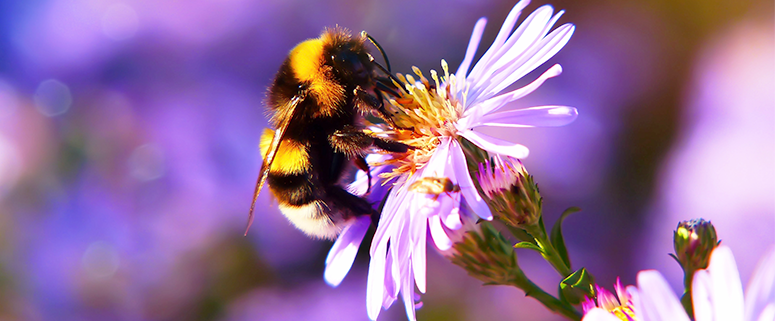The Bees’ Needs of Hampton Court
This years’ RHS Hampton Court Palace Garden Festival saw a significant emphasis on sustainable gardening, with designers showcasing the means to garden for wildlife all year round in a variety of spaces, featuring pollen centric ornamentals to encourage attendees to garden with pollinators in mind.
Pollinators contribute the equivalent of more than £500m annually to UK agriculture and food production through crop quality and quantity improvement. They also play an essential part in the nation’s wider, natural ecosystems.

The Bees’ Needs of Hampton Court
A 10-year National Pollinator Strategy was launched in 2014, outlining how the government, the public and professionals in the industry can aid in the recovery and colonisation of pollinators.
Included in this strategy is Bees’ Needs Week (10 to 16 July), an annual event coordinated by Defra, alongside a collection of organisations to raise awareness of bees and other pollinators.
Designers at Hampton Court demonstrated the ways in which gardening can support the natural colonisation of pollinators appropriate for a variety of possible housing and spacing limitations, from transient hard landscaping methods to planting favoured by pollinators.
Achillea featured throughout the showground this year, including in Carol Klein’s RHS Iconic Horticultural Hero Garden and multiple medal-winning gardens, with its availability in a variety of shades making it aesthetically more popular.
This low maintenance perennial has a long flowering season and is tolerant to a broad span of soils, while being highly attractive to pollinators.

Scabious was another perennial in abundance this year. Flowering from June into the autumn, this drought resistant plant can strive in poor soils, gravel and humus-rich rich beds, and is pollinator friendly.
There are around 6,000 species of insect involved in the pollination of crops or wild plants in the UK, with over 250 species of bee living in the wild in the UK, including bumblebees and solitary bees.
Bees’ Needs Week outlines ways everyone can support pollinators, highlighting actions available on multi-skill levels, several of which were prevalent on the showgrounds of Hampton Court.
Growing more nectar rich plants, many species of florae featured at Hampton Court, like Scabious and Allium sphaerocephalon create high levels of food for pollinators which can be cultivated in smaller, container style planters or gravel.
Practice gardening wild in areas of the garden, allowing nature to reclaim part of the land and create a thriving environment for pollinators and other local wildlife. Both People’s Choice awards went to gardens featuring a wilder planting style, The Cancer Research UK Legacy Garden, and The Wildlife Trusts: Renters’ Retreat.

The hat-trick award-winning Wildlife Trusts: Renters Retreat designed by Zoe Claymore focused on the ways people can support the natural colonisation of local wildlife in residential gardens, using exclusively tenant friendly features and zero pesticide.
Claymore says: “I’m hoping that it will empower people to realise what they can do when they rent and not let renting hold them back or be a barrier to reaping the rewards of gardening and not let renting feel like a barrier to supporting biodiversity and doing something very practical for themselves and for the planet.”
Supporting biodiversity and local wildlife, especially in urban areas has become prevalent in both the private and public sectors, as urban expansion continues.
The RHS show catalogue has seen a significant transition in recent years, from predominately stately designs to more accessible and practical designs that put sustainability and wildlife at the forefront, with the aim to encourage more people to get into gardening and supporting pollinators to increase the nation’s biodiversity.
For the latest industry news visit landscapingmatters.co.uk/news
Get all of the big headlines, pictures, opinions and videos on stories that matter to you.
Follow us on Twitter and Instagram for fun, fresh and engaging content.
You can also find us on Facebook for more of your must-see news, features, videos and pictures from Landscaping Matters




